- Home
- Jack Gantos
Jack Adrift
Jack Adrift Read online
For Anne and Mabel
Table of Contents
Title Page
Flotsam and Jetsam
Respect Detective
Lucky Buddha
Romance Novels
The Genius Test
A Bad Case of Brooding
Second Infancy
Will Rogers
BY JACK GANTOS
Copyright Page
Flotsam and Jetsam
The whole family was in the big white Buick Roadmaster convertible, which was as round and long as a whale out of water. My older sister, Betsy, named it Moby Dick and after twenty hours on the road Dad looked as bug-eyed behind the wheel as Captain Ahab. Dad had just bought it with bonus money the Navy gave him for enlisting in the Seabees, which was the branch of the Navy that built anything ships and sailors needed at their home base or when they docked at a port. Back in our small hometown he was a house builder and he thought this Navy stint would give us all a fresh start because, as he explained it to us one night over dinner, “We don’t stand a snowball’s chance of ever getting ahead while living out here in the sticks where people dig coal, eat squirrels, and build more outhouses than people houses.”
He was right. If we stayed out in the sticks we’d just be stuck there forever. But Mom had always lived out in the sticks and she didn’t want to leave her family behind. Still, Dad had a point. He looked Mom in the eye and waved his fork at us kids. “Do you want Betsy to have to clean other people’s houses for a living? Or Pete to be a fruit picker? Or have Jack junior here grow up like your brother Jim, who has to shoot coal-mine rats for a living?”
I wouldn’t have minded shooting rats for a living, but Mom agreed with Dad that our futures would be brighter elsewhere, so they decided we should become a Navy family and make the move to Cape Hatteras. We sold all our furniture and just brought Dad’s tools, the kitchen and bathroom stuff, and our clothes. It all fit easily into the Roadmaster’s trunk, which was as roomy as a walk-in closet.
On the AAA map, North Carolina didn’t seem far away from our town south of Pittsburgh. But on the road, we ran into a lot of construction and it was slow going. Still, the car was comfortable, and with the top up it smelled just like when you open a book for the first time, which kept the trip fresh and full of hope. In the backseat we played cards and travel games and did a lot of singing and then gradually we all started to fade. We got tired and pasty and worn-out and we flopped around and squabbled over pillows and kicked at each other for more space. The Roadmaster no longer felt roomy as we fell into a long period of grumpy silence.
Then, after a catnap, I thought I’d start a little conversation and perk everyone up again. But my conversational effort turned into a disaster. All I said was, “I’m a little concerned about how to make friends in a new place. Does anyone have any advice?” Well, that opened the floodgates to a nose-to-nose disagreement between Mom and Dad.
At first, all Dad said was, “The secret to making new friends is exactly the same secret as how to be a success in life—you just look people right in the eye and tell them what they want to hear. You’ll make all the friends you want and cut through life like a hot knife through butter.”
“I disagree entirely,” Mom said, alarmed. She turned toward me. “The best way to make friends and sail through life is to always be yourself. And that is not a secret. Everybody knows honesty is the best policy.”
“You mean a policy for people who don’t have any ambition,” Dad said. Lately he worked the word ambition into every conversation.
“No,” she said, raising her voice, “ambition is no excuse to turn your back on honesty and self-respect.”
Betsy groaned. “See what you started,” she hissed, then slumped down in her seat and looked miserable.
“Self-respect is overrated,” Dad shot back. “I always feel a lot better when I get exactly what I want. Only whiners sit around worrying about self-respect.”
“Well, that is one of the fundamental differences between us,” Mom declared. “You have no respect for the truth. You’ll say anything to get what you want and I won’t stoop to such low-life tricks.” Then she turned back to me. “My dad never told a lie in his life,” she said with great pride.
“And where’d that get him?” Dad asked.
“He’s a pillar of the community,” Mom said proudly. “And people want to be his friend because they know he won’t lie to them, and feed them a load of you know what …”
“The only load of you know what is what you are telling Jack—”
Mom cut him off. “I don’t want to talk about this nonsense anymore,” she said, dicing the air with her words.
Suddenly, instead of feeling like I was riding a whale, I felt swallowed by it. But I did start thinking about what they had said. I had seen both of them tell stories, and they each had a different style. Dad would say anything to keep people on the edge of their seats. Every time he went to the Elks Club he’d draw a crowd, tell wild stories, and drink for free. Once in a while he’d take me, so I got to see him in action. When we’d enter the club he’d give me a dollar in quarters and send me to a far corner to play the pinball machines. He’d lean on the bar and tell a story to the bartender. Then the bartender would start to gather a crowd. “Get over here,” he’d holler to a few guys who were bored and staring down into their beers. “You gotta hear this story. Go ahead, Jack,” he’d say as the men moved closer to Dad, “tell it again.” And with each good laugh a few more guys pulled up chairs and drinks and Dad jumped into action again, telling more outrageous stories and giving the crowd just what they wanted—a thrill. They didn’t seem to care if the stories were true or not.
On the other hand I had been with Mom when she was telling a story about her Mayflower relatives to the well-dressed ladies down at the Daughters of the American Revolution headquarters. It was all I could do to keep from falling asleep as she went on and on about every little family-tree detail, and then she would pause for a minute and roll her eyes up into her head to sort out some fact in her mind until she got it all straight and then would inch forward again. And even though the D.A.R. ladies were polite, I could spot their necks flexing and faces swelling out from stifled yawns …
After a while the road began to dip down, then rise up, and then dip down as if we were driving across the ocean. Suddenly my little brother, Pete, bleated, “I don’t feel too good.” I heard something surging up his throat and quickly grabbed him by the hair and yanked his face toward his sneakers. He missed me but sprayed his shoes, and with a follow-up blast he made a chocolate brown puddle, colorfully speckled with some undigested M&M’s, on the floor behind Dad’s seat. Even though it was kind of pretty puke, it smelled toxic.
Dad smoothly pulled over to the side of the road. He hopped out of the car and opened the trunk. Mom leaned way over her seat and patted Pete on his sweaty head.
“You’ll be fine,” she said. “It was just a little motion sickness, but now it’s over with. Happens to the best of us.”
I wondered if Mom was telling Pete what he wanted to hear, or if she was telling the truth. If he threw up again would he think she was lying? Because I already knew that part of what she said was a lie—I never had motion sickness and I was better than he was, so it didn’t always happen to “the best of us.”
Dad opened Pete’s door and caught a fresh whiff of the puke. “Holy mackerel!” he cried out, and took a deep breath before leaning in and sopping it up with a car rag. When he finished cleaning up, he tossed the rag in a ditch by the side of the road and wiped his hands on the grass.
“Time to lower the roof and air this big boy out,” he said to no one in particular. He unhooked the chrome clamps above the sun visors and lifted the stiff top. It folded back like an ac
cordion and Dad stuffed it down into a gap behind the backseat and snapped it into place under a white vinyl cover. It was so cool.
When he got back into his seat, he put the car in gear and we merged with the ongoing traffic. The road construction was behind us and he hit the gas. It felt like we were in a wind tunnel. Mom had one hand holding down her plaid floppy summer hat while the fingers of her other hand dug into Dad’s shoulder. Betsy sat squinting unhappily, fighting a desperate battle to keep her long black hair from constantly whipping across her eyes. A hurricane had swept the coast two days before and the trailing clouds were still bloated and low, and it was threatening to rain. Lightning slashed above the distant trees. Wet leaves flattened against the windshield. Still, it was thrilling to see everything so clearly with the top down. Then, just when I thought no one would ever speak again, Dad cleared the air with an upbeat remark.
“This baby has a nose for the ocean,” he said proudly, steering toward Cape Hatteras with one hand on the wheel and the other loosely hanging down over the outside of the door like shark bait. He was eager to get over the Wright Brothers Memorial Bridge and to the Outer Banks before nightfall.
When we reached the bridge there was a Coast Guard sailor on sentry duty. A black-and-white-striped sawhorse blocked the road and the sailor lazily waved a long flashlight with a glowing orange rim over his head. Dad slowed down and pulled toward him.
“The bridge is closed,” the sailor announced, chewing on a huge wad of gum which caused his cheek muscles to throb and flex like a human heart. “The water hasn’t pulled back all the way since the storm. Still about six inches over the roads.”
Dad pulled out his Navy identification card and showed it to the guard. “Cape Hatteras is my new assignment,” he said. “I’m supposed to be on-site tomorrow.”
The guard hesitated. “I don’t know,” he said, with his jaws pumping blood to his brain. “That’s a lot of water.”
“Mister, I’m in the Navy,” Dad said. “Six inches isn’t enough to drown in. Besides, this Buick is more boat than car. A few inches of water can’t scuttle us.”
“Then help yourself,” the sailor said, turning to lift the sawhorse barrier to one side. As we passed by he called out, “Hope you have some life jackets.”
Mom looked spooked. “Honey, do we have life jackets?”
“Just use your seat cushion,” Dad suggested, and laughed. He was in a great mood.
We slowly motored up the bridge as if we were clanking our way up the log flume ride at an amusement park.
“See!” Dad shouted into the wind. “What I told the guard back there is a perfect example of what I said earlier. I don’t have to be at work for a week, but I had to tell that sailor what he wanted to hear or else he’d’ve had us spend the night in a motel as if we had money to burn.”
“Jack senior,” Mom said sharply, getting stirred up again, “that’s called lying.”
“No,” Dad replied, “that’s called getting what you want from someone too stupid to give it to you in the first place.”
“Don’t listen to him,” Mom said. Pete wasn’t because he was so sick. Betsy wasn’t because she was wearing her miserable face again, which meant she wouldn’t listen even if you pressed a bullhorn against her ear and shouted, “I’M A JERK! HIT ME!” But I was listening to Dad a lot because I was trying to figure out who I was, and how to be. School was starting in a few days and I expected the local kids were going to be staring at me, then whispering among themselves, then approaching me, then they’d want to know who I was, where I came from, and did I have any hobbies or favorite sports, or was I good at anything at all? I knew it would be a lot easier to take Dad’s advice and just make up something incredible they would think was cool. Or, I could simply tell them the truth, the whole truth, and nothing but the truth, which is that I am totally boring.
When we reached the top of the bridge, Dad stopped and we looked down on the Outer Banks. We gasped. There was no land. The bridge just slanted down into the water like a boat slip. I knew it wasn’t deep, though, because all the houses were above water and I could see where the sea lapped up to their first doorsteps. Still, it looked like we were getting ready to drive right across the Atlantic Ocean toward France.
Mom smacked her lips in the nervous way she does before saying something that might rattle Dad and set him off. “Are you sure it’s safe to go down there?”
Dad grinned. “You never know till you try it,” he said gleefully, and lifted his foot off the brake. The car tilted forward and began to pick up speed.
“Jack,” Dad hollered, “if Pete has to tip his bucket again, just aim his mouth overboard.”
“Aye-aye, Captain,” I called back, and gave him a snappy salute. I was ready to join the Navy myself.
“Betsy,” Dad said, catching her scowling face in the rearview mirror, “get ready to bail.”
“Can I just bail myself out of here?” she said as she glowered.
The car was humming down the bridge and by the time we hit the bottom our faces were all pulled back in absolute terror. We screamed. The water splashed up in front of us and a shower sprayed back over the windshield, and for a moment the car seemed to glide weightlessly across the surface before settling down on the asphalt. The sailor had been right. The water was only about six inches deep. “We’re here,” Dad announced, as he slowly navigated along the faint center line just visible under the water. Behind us our wake spread out as if we were in a boat.
“Now let’s see if we can find our street,” he said. “It’s supposed to be somewhere off of Virginia Dare Trail.” After we all caught our breaths, we called out the names of streets as we trolled along.
“Too bad I don’t have a fishing pole,” Dad said. “We could catch dinner on the way to the house.”
“You could tie a line to the radio antenna,” I suggested.
“Yeah,” he added, “we’ll have to get some surf-casting poles and I can show you how to catch a big one.”
Or just say that you caught a big one, I thought.
Just then we passed a school and a cemetery. I wondered if that was my school and if I would flunk out and end up next door in the graveyard. The white crosses and mossy tombstones seemed like the tips of ghostly topmasts and flags over sunken ships. “Once during a flood when I was a kid,” Dad said joyfully, “coffins popped right out of the ground and we paddled them around like canoes.”
“Jack,” Mom cried out, and elbowed him, “that can’t be true!”
“Sure it is,” he said with a laugh. “Would I lie to you?”
I wanted to find a coffin. Maybe Dad would let me tie it to the back of the car and I could ride it. But I didn’t spot anything floating around the cemetery except for plastic flowers, garbage, and clumps of seaweed.
There were no other cars on the road.
A few people had stayed and their lights were on. Some were sweeping water out their front doors. When they looked up at us, we waved and they waved back. Wet carpets were stretched across sagging clotheslines. Sand bags edged the yard of a big house, but the water still got through. A banner in front of a cottage the size of a kid’s playhouse read: WE SURVIVED! BUT THE STORM BLEW AWAY!
“These people are nuts,” Dad declared. “I wouldn’t stay out here in a storm.”
“What are people going to say when they wake up or return and find us here?” Mom said. “They’ll think we are a bunch of sea monkeys.”
“Yeah,” Betsy said, perking up, “they’ll throw a net over us and call the aquarium.”
“Or the funny farm,” Mom added.
“Early to bed, early to rise makes a man healthy, wealthy, and wise,” Dad said confidently, as if quoting one of the Ten Commandments.
“That’s right,” I chimed. “The early bird gets the worm.”
Betsy squinted angrily at me. “Don’t humor him,” she whispered.
A long time passed and we didn’t find our street name but finally we spotted a blue-and-white s
ign that read: SEABEE HOUSING. WELCOME, SAILORS!
“That’s us,” Dad said merrily, pointing. There were five long house trailers that looked as if they were set down in the middle of a swamp of thick reeds, saw grass, and scrawny, windblown trees. We almost missed the trailers because they were painted in green-and-tan camouflage.
“One of these must be ours,” Dad said, looking over a letter with his instructions.
Mom snatched the letter out of his hands. “It can’t be,” she said, reading it quickly. “It’s sitting in a swamp.”
“That’s not a swamp,” Dad replied, waving toward the house trailer. “It’s probably a tidal pool. Something educational for the kids.”
“Something to immunize them against,” Mom said. “I won’t live in one of these shoe boxes.”
Dad ignored that statement and pulled the letter back out of her hands. “Says here number three is ours.”
“I can’t believe we’ve traveled this far to live like trash in a swamp,” Mom said, getting a bit huffy. “If my father saw this he’d …”
Betsy glanced over at me. “Here we go again,” she sang, as if it were my fault.
“Now don’t feel bad,” Dad replied. “We’re all in the same boat. It’s just temporary Navy housing.”
“Well I didn’t join the Navy,” she said.
“You did worse,” Dad said with a laugh. “You married the Navy, which is ten times as bad ’cause you don’t even get paid.”
“Yeah,” she said without much humor. “And now that I’ve been captured I’m being tortured, too.”
“Yep,” Dad said. “You’ll just have to show some grit, because the Geneva convention doesn’t cover marriage.”
Mom reached over and pinched him until he hollered. That must have made her feel a little better because she did show some grit. She always tried to make the best of a bad situation. “There’s number three,” she said. “Dock this boat and let’s go see just how bad it is.”
Dad drove up to the front door. If I’d had a rope I would have run a line from the hood ornament to the doorknob to keep us from drifting out to sea.

 Jack Adrift
Jack Adrift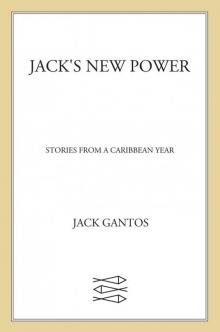 Jack's New Power
Jack's New Power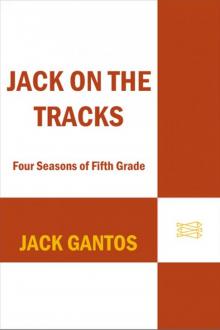 Jack on the Tracks
Jack on the Tracks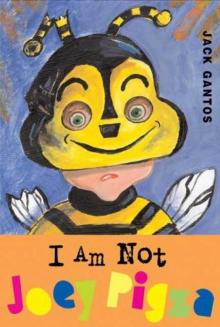 I Am Not Joey Pigza
I Am Not Joey Pigza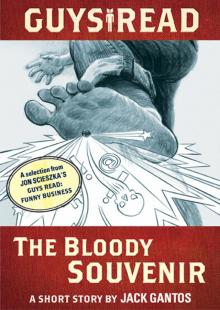 The Bloody Souvenir
The Bloody Souvenir Joey Pigza Loses Control
Joey Pigza Loses Control Heads or Tails
Heads or Tails Hole in My Life
Hole in My Life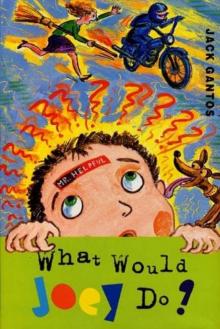 What Would Joey Do?
What Would Joey Do? The Trouble in Me
The Trouble in Me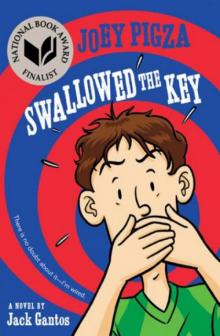 Joey Pigza Swallowed the Key
Joey Pigza Swallowed the Key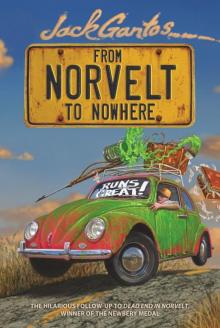 From Norvelt to Nowhere (Norvelt Series)
From Norvelt to Nowhere (Norvelt Series)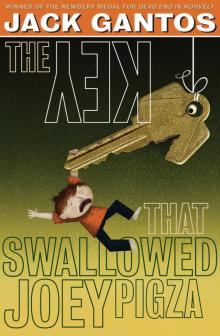 The Key That Swallowed Joey Pigza
The Key That Swallowed Joey Pigza Jack's Black Book
Jack's Black Book Dead End in Norvelt
Dead End in Norvelt